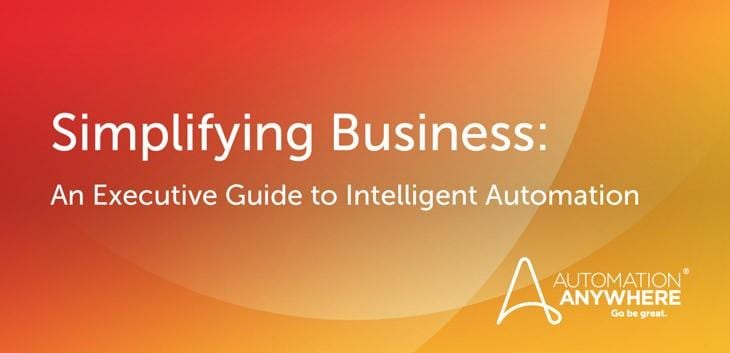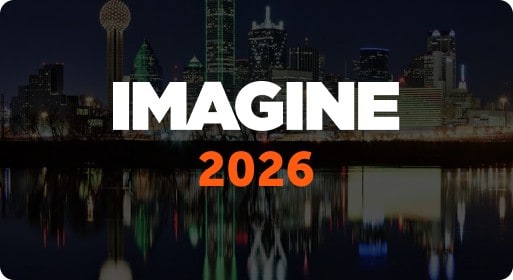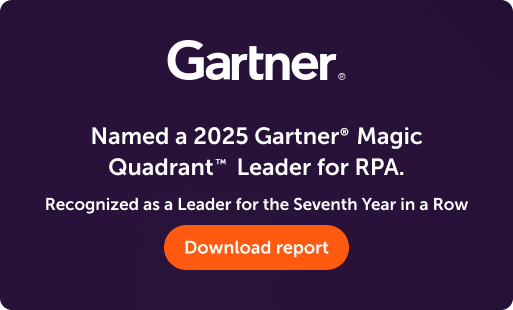- Login
- Search
- Contact Us
-
Have a question? Our team is here to help guide you on your automation journey.
-
Explore support plans designed to match your business requirements.
-
How can we help you?
-
- AI
AI Without the Hype From pilot to full deployment, our experts partner with you to ensure real, repeatable results. Get Started
- Automation Anywhere AI
-
- Solutions
Featured Agentic Solutions
Accounts Payable Invoice automation—No setup. No code. Just results. Accounts Payable
Customer Onboarding Scale KYC/AML workflows. Customer Onboarding
Customer Support Keep queues moving, even at peak load. Customer Support
Healthcare RCM Revenue cycle management that runs itself. Healthcare RCM
- Products
Platform Features
- Agentic process automation (APA)
- Robotic Process Automation (RPA)
- View all Products
-
- Resources
Get Community Edition: Start automating instantly with FREE access to full-featured automation with Cloud Community Edition.
Featured
 Named a 2025 Gartner® Magic Quadrant™ Leader for RPA.Recognized as a Leader for the Seventh Year in a Row Download report Download report
Named a 2025 Gartner® Magic Quadrant™ Leader for RPA.Recognized as a Leader for the Seventh Year in a Row Download report Download report- Become an Expert
- Developer Tools
- Get Support
- View all resources
-
- Partners
Find an Automation Anywhere Partner Explore our global network of trusted partners to support your Automation journey Find a Partner Find a Partner
- Find a Partner
- For Partners
-
Blog
Simplifying Business: An Executive Guide to Intelligent Automation
Combined with Robotic Process Automation (RPA), artificial intelligence (AI) is serving as neural dust that’s well on its way to behaving similarly to human brain cells. As such, AI-powered RPA, or intelligent automation, is now a path to solving business problems and helping C-level leaders mature a business faster.
According to Harvard Business Review, artificial intelligence will add $13 trillion to the global economy over the next decade. AI is already taking on futuristic tasks such as self-driving cars, accelerating pharmaceutical discoveries, and improving workflow agility around the world.
The evolution of AI
AI largely originated with Alan Turing, the creator of the first cryptographic machine to break the Nazi code during World War II. He worked as a code breaker for the UK government during the war, attempting to decode the German Enigma encryption device.
In collaboration with his colleagues at the code-breaking center, Turing developed a machine called the Bombe, which was capable of scanning intercepted German transmissions and decoding the 159 billion possible German encryption schemes.
Postwar, Turing suggested a computer can possess AI if it can mimic human responses under specific conditions. He developed the Turing test to determine if a machine could think like a human, and his attempts at having a machine exhibit intelligent behavior became the foundation of artificial intelligence.
Inside today’s era of intelligent automation
AI has evolved and extended the scope of regular rule-based automation to include cognitive functions, resulting in improved performance throughout tasks. In fact, according to Accenture, AI will be one of the top three strategic priorities for business leaders to implement automation in customer service, bank loans, pharmaceutical drug research, and more.
The real power of intelligent automation, however, is that it fundamentally changes traditional ways of operating. It transforms the possibilities of what companies can achieve by seamlessly integrating technology, work processes, and people. AI combined with RPA is the best way to automate incredibly complex business tasks.
8 ways AI benefits your company
AI’s insatiable hunger for data is transforming a variety of industries in a number of ways:
- Computer vision: AI recognizes, identifies, captions, sorts, and communicates with ocular tools or legacy storage systems for accurate analysis.
- Face recognition: By accurately detecting faces in images, AI offers person recognition, emotion recognition, and grouping of images.
- Machine learning: AI helps software bots self-learn from data and train for predicting outcomes or classifications based on data analysis.
- Speech to text, text to speech, and translation: Converting speech to text or translating one language to another is effortless. AI is also useful for speaker recognition and verification.
- Natural language: AI can facilitate your apps and business ecosystem for natural language processing to evaluate sentiment and effectively accommodate your customers.
- Text analytics: AI speeds key information extraction, named entity recognition, and text sentiment.
- Anomaly detection: You can gain real-time diagnostics on your business health with the center of excellence dashboard in our mobile app.
- Instant personalizer: AI detects and filters offensive content and undesirable images. It also learns your preferences and delivers rich, personalized experiences.
Ease your automation integration
If your business is in the planning stage of adopting intelligent automation, start by identifying areas that could benefit from AI. Consider how to embed a pilot automation program seamlessly into existing workflows — without disrupting other parts of your business.
Once that initial plan is created, communicate with your employees about automation and let them know how it will enhance their work, not replace their jobs.
A dedicated center of excellence team should also be in place to identify processes for automation, keep an eye on risks, issues, and opportunities, and see how new tasks can be automated. With mundane tasks being handled by automation, your employees will be inspired to do more of the knowledge-based work they were hired to do.
New approaches are the future
AI is associated with tasks that require human intelligence, including planning, learning, reasoning, problem-solving, and perception. AI robots can synthesize vast amounts of data, simplify complex workflows, learn, and adapt without any errors.
As intelligent automation reaches its full potential, it amplifies, not replaces, human effort. AI and RPA offer new ways to collect, analyze, sort, store, communicate, and connect. And, when the two are used together, they empower business leaders to make informed decisions based on up-to-the-moment information while integrating various systems to build future-ready operations.
See intelligent
automation in action.
About Avi Bhagtani
Avi Bhagtani is senior director of product marketing, focused on artificial intelligence and cognitive automation. He has multiple years of industry experience managing global software product portfolios in software, the Internet of Things, AI, and cloud organizations.
Subscribe via Email View All Posts LinkedInGet to know the Agentic Process Automation System.

For Students & Developers
Start automating instantly with FREE access to full-featured automation with Cloud Community Edition.



